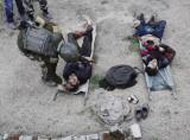Srinagar, Dec 5: In multiple attacks two days ahead of the Prime Minister's visit to Jammu and Kashmir, militants stormed an Army camp in Uri in Baramulla district, killing 11 security personnel, including a Lt Col, and targeted a police party in Shopian while a top LeT commander was killed in an encounter.
In a daring pre-dawn attack ahead of third phase of elections in Jammu and Kashmir on December 9, heavily armed militants killed 8 Army men and three policemen around 3.10 AM at the camp in Mohra in Uri tehsil of north Kashmir's Baramulla district.
Six militants were also killed in the attack at the Army camp which is 20 km from the Line of Control (LoC), official sources said.
A Lt Colonel and seven Army personnel were among the dead. While bodies of four army personnel were charred, one had burn injuries and the other three had bullet injuries, the sources said.
Uri is about 100 km northwest of Srinagar, where Prime Minister Narendra Modi is due to campaign on Monday.
In Delhi, Defence Minister Manohar Parrikar said, "It is possible that this has happened because of elections... We will eliminate the remaining militants who are trapped."
Jammu and Kashmir Chief Minister Omar Abdullah said the attack was a "desperate attempt" to disrupt peace and normalcy.
"Once again shows the desperate levels militants will go to disrupt peace and normalcy," he tweeted.
Police said at least six militants had infiltrated into the Valley from Pakistan-occupied Kashmir recently.
In Soura in the outskirts of the city, top Lashkar-e- Taiba commander Qari Israr was killed by security personnel when he was trying to enter the city, police said.
Police said at least two militants travelling in a car tried to speed away from a check point at Ahmadnagar in Soura area this afternoon.The policemen chased the car and in the ensuing gun battle, Israr was gunned down. One AK-47 rifle was recovered from him.
The area has been cordoned off as another militant had taken refuge in a house in the same locality, it said.
Director General of Jammu and Kashmir Police K Rajendra said it was a big catch as the militant, a Pakistani national, was wanted in many cases.
Police have intensified random search of vehicles following intelligence inputs that militants might carry out a suicide attack in the city ahead of the elections and the scheduled rally of the Prime Minister on Monday.
In the third attack, militants hurled a grenade at a police ambush party in Shopian in south Kashmir but there were no reports of any casualty.
Shopian area has been vulnerable as militants coming from Doda region through Peer Panjal Range have been using this area as a transit spot.
On December 2, Army foiled an infiltration bid in Handwara area of Kupwara district killing six militants while one army personnel was also killed. The infiltration bid was foiled even as people in Kupwara district were voting to elect their representatives.
Militants also struck in Pulwama district of south Kashmir where one person was killed and six others injured today in a grenade attack at crowded bus stand.
Police said that unidentified militants lobbed the grenade on a security patrol at Tral bus stand, 35-km from Srinagar, killing Ghulam Hasan Mir (60) and injuring six others.
The injured have been admitted in hospital while the area was cordoned off immediately after the strike as a hunt was launched to nab the militants, police added. No militant outfit has so far claimed responsibility for the Tral attack.
Meanwhile, security forces succeeded in eliminating the second militant who had tried to infiltrate into Srinagar along with top LeT commander Qari Israr, who was killed in the initial exchanges after the duo tried to escape when intercepted at a checkpoint.
The operation took place in the Soura area of the summer capital. The two slain militants were part of a module tasked with carrying out a big strike in the coming days, police said.
In Uri, the encounter between troops and the group of militants lasted just over six hours, army said giving details of the attack.
"During the initial part of the operation, one terrorist opened fire on the vehicles of the quick reaction teams (QRT) of the neighbouring unit rushing to the site, in which one (vehicle) went off the road and overturned, leading to casualties among the security forces.
"The terrorist was immediately eliminated by the troops of the QRT and his body recovered," army said in a statement.
A barracks also caught fire during the operation with some soldiers getting trapped inside. Army said that the fire was caused by the toppling of a kerosene heater.
"The operation continued relentlessly and by 9.30 A.M. the terrorists were eliminated. During the deliberate clearing-up operations which commenced thereafter, the bodies of five more terrorists were recovered, bringing the number of terrorists eliminated to six," it said.
One officer and seven soldiers of the army lost their lives in the attack along with one ASI and two constables of police, army said.
"Six AK rifles with 55 magazines, two shotguns, two night vision binoculars, four radio sets, 32 unused grenades, one medical kit and a large quantity of miscellaneous warlike stores were recovered from the slain terrorists," it added.
Army is continuing the operation in the surrounding areas to search for any terrorists who may still be hiding or trying to escape, the statement said.





Comments
Add new comment